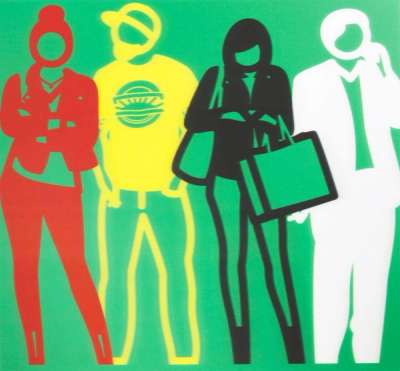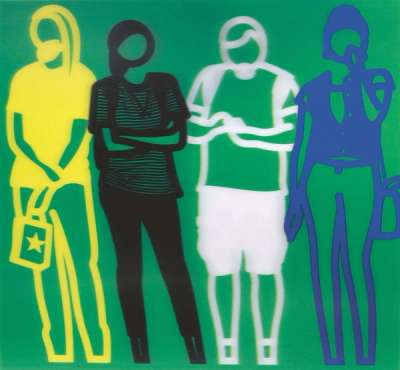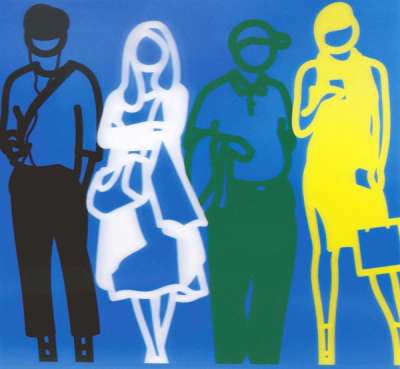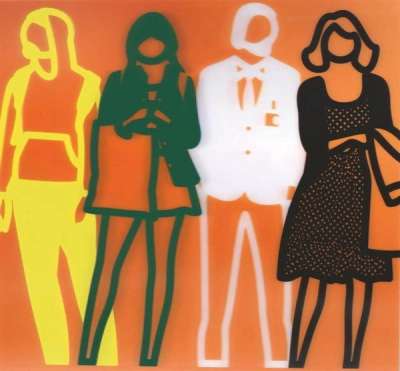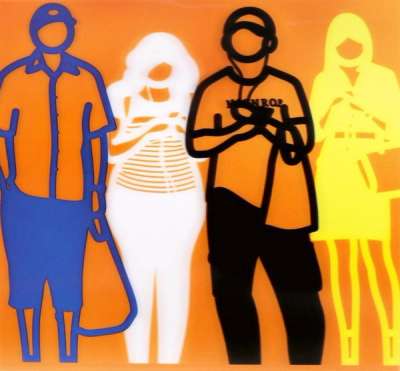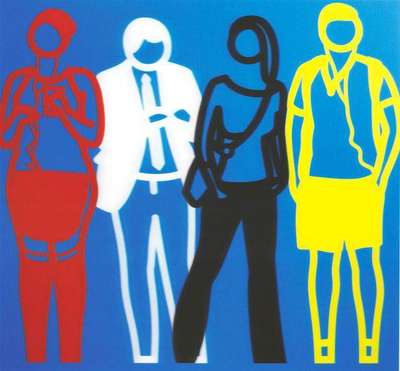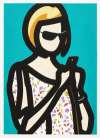Standing
People
Julian Opie's Standing People series pays attention to the innumerable passerbys of city life, engaging the viewer's own unconscious relation to the city and the people they ignore. The Standing People series is representative of Opie’s skill in striking a balance between the realism of fine art and the eye-catching elements of graphic design.
Julian Opie Standing People For sale
Standing People Value (5 Years)
Sales data across the Standing People series by Julian Opie varies by print. While standout works have sold at auction for up to £23522, other editions in the series remain rare to market or have yet to appear publicly for sale. Of those tracked, average selling prices have ranged from £7591 to £7591, with an annual growth rate of -8.79% across available data. Collectors should note the discrepancy in performance between more visible and lesser-seen editions when considering value potential in this series.
Standing People Market value
Auction Results
| Artwork | Auction Date | Auction House | Return to Seller | Hammer Price | Buyer Paid |
|---|---|---|---|---|---|
 Red White Black Yellow Julian Opie Signed Print | 25 Nov 2025 | Bonhams New York | £6,375 | £7,500 | £9,500 |
 Black White Green Yellow Julian Opie Signed Print | 18 Jan 2024 | Phillips London | £11,900 | £14,000 | £19,000 |
 Yellow Black White Blue Julian Opie Signed Print | 17 Jan 2024 | Phillips London | £7,225 | £8,500 | £11,500 |
 Red Yellow Black White Julian Opie Signed Print | 24 Oct 2023 | Phillips New York | £12,325 | £14,500 | £20,000 |
 Yellow Green White Black Julian Opie Signed Print | 19 Jan 2022 | Phillips London | £11,900 | £14,000 | £19,000 |
Sell Your Art
with Us
with Us
Join Our Network of Collectors. Buy, Sell and Track Demand
Meaning & Analysis
Julian Opie’s Standing People series from 2020 is a set of prints showing subject matter the artist is renowned for, the human figure. Each print shows four full-length figures standing in a casual manner as though waiting for a bus and facing outwards to the viewer. The figures are each depicted in a different colour, as indicated by the titles of the prints.
Set against a brightly coloured backdrops, this series is eye-catching and immediately recognisable as Opie’s work due to the use of bold line, simplified shapes and use of people as its subject. Opie is considered to be a painter of modern life, creating work based on photographs but simplified to their basic and most minimal elements by which a person or object can be recognised. The Standing People series shows the figures dressed in distinctly modern clothing characteristic of the 2010s, depicted in bright saturated colours reminiscent of the visual language of computer games and mass advertising.
As with many of Opie’s depictions of people, each figure is rendered faceless with a blank circle as a head. Despite this, these people are uniquely distinguishable due to Opie’s attention to detail with clothing and each person’s stance or gate. Speaking of his depictions of people from photographs taken in public, Opie has said, “Each figure throws up surprises and opportunities that I could not invent – a tattoo or a tasselled dress, a goatee or the logo on a T-shirt.”
Captured in the artist’s structured and graphic visual language, the prints in the series encapsulate contemporary city life in a way that makes the viewer think about their own body in relation to the compelling image. Opie rationalises the human form in a decidedly stylised manner, striking a balance between the soft and human, and the hard and artificial, producing an uncanny effect. Undertaking a task that has preoccupied artists for generations, Opie captures modern life in an entirely unique way.
Using lenticular technology as a key component to this work, Opie produces a moving image that shows the figures making small movements such as folding their arms. Opie has demonstrated a keen interest in movement and animation throughout his career, often using movement as a form of realism.
